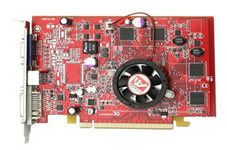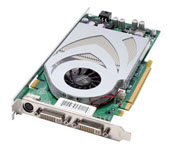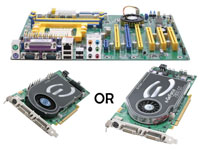Mid-Range Buyer's Guide, September 2005
by Jarred Walton on September 19, 2005 12:05 AM EST- Posted in
- Guides
Graphics Recommendations
All of the motherboards are obviously PCI Express systems, so we only need two graphics options. For the Gaming system, we recommend that you spend as much money as possible on a graphics card. SLI is always there for future upgrades, but we'd start with a single, fast GPU rather than purchasing two moderately fast GPUs and running them in SLI. Here are our two choices for graphics.
Office Graphics Recommendation: Connect3D Radeon X700 Pro 128MB
Price: $98 shipped (Retail)
While there are cheaper graphics cards for PCI Express, none of them are particularly fast. You can save about $50 by dropping to a GeForce 6200TC or X300SE HyperMemory if you really want. We prefer to get something with a bit more performance, ensuring not only the ability to play games now and then, but also giving better hardware 3D acceleration for Windows Vista when that comes out. The X700 Pro fits those requirements by roughly doubling the performance of the 6200TC and X300SE cards. What that gives us is a PC that's capable of handling any task at least acceptably and some tasks exceptionally.
For a bit more money, there are quite a few upgrade options. X800 128MB, 6600GT, 6800, X800GT/GTO, X800Pro, X800XL... the list goes on. If you don't feel that the X700 Pro will meet your needs, we'd probably upgrade to at least the X800XL/Pro or 6800GT. Those are all roughly twice as fast, and they're about twice as much - more in the case of the 6800GT. Once you near the $300 price range, though, you should probably just jump to our gaming recommendation.
Gaming Graphics Recommendation: XFX 7800 GT Overclocked
Price: $379 shipped (Retail)
For the Gaming configurations, the idea is quite simple: save on the CPU costs and some other areas in order to get the fastest graphics card possible, within our budget. The key there is staying within budget, which means that we're not actually getting the fastest GPU, as that would be the 7800GTX. You could even drop the GPU to a 6800GT if you want to save some money, but the 7800GT is substantially faster and we feel that it's worth the upgrade. Like the 7800GTX cards, almost all currently available 7800GT cards are based of the NVIDIA reference design, with a few minor tweaks. The XFX card comes factory overclocked and costs less than most other 7800GT cards at present, so it gets our recommendation. However, it is possible that some of the other 7800GT cards are quieter than the XFX, so if you have information to that effect, spending another $10 to $15 would be advisable. On the other hand, louder and cooler might be a better choice for longevity.
As you can see in our 7800GT Preview, the card performs quite well. The XFX OC is even slightly faster, which you can see in our XFX 7800GT OC Review. Since it's faster than the 6800 Ultra in virtually every test, there's no reason to get a 6800 Ultra anymore. Another piece of good news is that when the 7800GT becomes too slow for your needs - as it inevitably will - you can always add a second card and get a substantial performance boost. That's assuming, of course, that the 7800GT remains on the market long enough for you to upgrade; we hope that it will, but two years from now we may find it discontinued for one reason or another.
AMD Gaming Platform Alternative: EVGA 7800 GT or 7800 GTX with free EVGA SLI motherboard
Price: $449 or $549 shipped (Retail)
The reason why we list this as an alternative is because it's a limited time offer. EVGA has finished their direct sales offer, but you can still get the same deal from Newegg and ZipZoomFly. How long it will be available is anyone's guess. The deal is quite simple: buy an EVGA 7800 GT or GTX card and you get the EVGA motherboard for free. The EVGA board is just a rebranded version of the Jetway 939GT4-SLI that we recently reviewed, and performance and features are very good. Jetway isn't known for producing high performance, enthusiast class motherboards, but this particular board exceeded all our expectations.
Is the EVGA/Jetway board better than the DFI SLI-D? Perhaps not, but it's close enough that the savings offered make it worth its consideration. When compared to the DFI and XFX configuration that we're recommending, you can get the EVGA bundle for about $100 less, or alternatively, you can get the EVGA 7800GTX instead of the XFX 7800GT. Either option is a good deal, relatively speaking, so if you're in the market to upgrade right now, you might want to act quickly. The EVGA promotional page has more details and links to participating resellers if you're interested.
All of the motherboards are obviously PCI Express systems, so we only need two graphics options. For the Gaming system, we recommend that you spend as much money as possible on a graphics card. SLI is always there for future upgrades, but we'd start with a single, fast GPU rather than purchasing two moderately fast GPUs and running them in SLI. Here are our two choices for graphics.
Office Graphics Recommendation: Connect3D Radeon X700 Pro 128MB
Price: $98 shipped (Retail)
While there are cheaper graphics cards for PCI Express, none of them are particularly fast. You can save about $50 by dropping to a GeForce 6200TC or X300SE HyperMemory if you really want. We prefer to get something with a bit more performance, ensuring not only the ability to play games now and then, but also giving better hardware 3D acceleration for Windows Vista when that comes out. The X700 Pro fits those requirements by roughly doubling the performance of the 6200TC and X300SE cards. What that gives us is a PC that's capable of handling any task at least acceptably and some tasks exceptionally.
For a bit more money, there are quite a few upgrade options. X800 128MB, 6600GT, 6800, X800GT/GTO, X800Pro, X800XL... the list goes on. If you don't feel that the X700 Pro will meet your needs, we'd probably upgrade to at least the X800XL/Pro or 6800GT. Those are all roughly twice as fast, and they're about twice as much - more in the case of the 6800GT. Once you near the $300 price range, though, you should probably just jump to our gaming recommendation.
Gaming Graphics Recommendation: XFX 7800 GT Overclocked
Price: $379 shipped (Retail)
For the Gaming configurations, the idea is quite simple: save on the CPU costs and some other areas in order to get the fastest graphics card possible, within our budget. The key there is staying within budget, which means that we're not actually getting the fastest GPU, as that would be the 7800GTX. You could even drop the GPU to a 6800GT if you want to save some money, but the 7800GT is substantially faster and we feel that it's worth the upgrade. Like the 7800GTX cards, almost all currently available 7800GT cards are based of the NVIDIA reference design, with a few minor tweaks. The XFX card comes factory overclocked and costs less than most other 7800GT cards at present, so it gets our recommendation. However, it is possible that some of the other 7800GT cards are quieter than the XFX, so if you have information to that effect, spending another $10 to $15 would be advisable. On the other hand, louder and cooler might be a better choice for longevity.
As you can see in our 7800GT Preview, the card performs quite well. The XFX OC is even slightly faster, which you can see in our XFX 7800GT OC Review. Since it's faster than the 6800 Ultra in virtually every test, there's no reason to get a 6800 Ultra anymore. Another piece of good news is that when the 7800GT becomes too slow for your needs - as it inevitably will - you can always add a second card and get a substantial performance boost. That's assuming, of course, that the 7800GT remains on the market long enough for you to upgrade; we hope that it will, but two years from now we may find it discontinued for one reason or another.
AMD Gaming Platform Alternative: EVGA 7800 GT or 7800 GTX with free EVGA SLI motherboard
Price: $449 or $549 shipped (Retail)
The reason why we list this as an alternative is because it's a limited time offer. EVGA has finished their direct sales offer, but you can still get the same deal from Newegg and ZipZoomFly. How long it will be available is anyone's guess. The deal is quite simple: buy an EVGA 7800 GT or GTX card and you get the EVGA motherboard for free. The EVGA board is just a rebranded version of the Jetway 939GT4-SLI that we recently reviewed, and performance and features are very good. Jetway isn't known for producing high performance, enthusiast class motherboards, but this particular board exceeded all our expectations.
Is the EVGA/Jetway board better than the DFI SLI-D? Perhaps not, but it's close enough that the savings offered make it worth its consideration. When compared to the DFI and XFX configuration that we're recommending, you can get the EVGA bundle for about $100 less, or alternatively, you can get the EVGA 7800GTX instead of the XFX 7800GT. Either option is a good deal, relatively speaking, so if you're in the market to upgrade right now, you might want to act quickly. The EVGA promotional page has more details and links to participating resellers if you're interested.













56 Comments
View All Comments
GMAN003 - Friday, October 7, 2005 - link
First of all, Great guide Jarred! Because of your article I am now an AnandTech member for life! @$$kissing aside, here are some of my questions and suggestions for your article.1) Would you have noticed any significant speed gains by using different memory types such as DDR500 memory as recommend by DFI on their website? Yes, I know, its more expensive, but for the enthusiast on a budget, wouldn't overclocking memory be more up my ally especially for any future processor upgrades?
2) For future guides, you may want to consider a more comparable AMD vs Intel office processor. From reading other articles on the web, isn't the AMD64 3800 X2 processor more comparable to an Intel Celeron D 830 processor? In fact, in some benchmarks I have seen the 3800X2 be faster than the Intel Celeron D 840 processor?
3) I bought almost every part in your gaming system for a friend, except for the case/pwr supply and hard drive. Rolling the dice with an Aspire X-Navigator 500watt just for looks and a Raptor74GB for seek/write times. Any future posts on what you have been able to reach as "stable" OC levels and what your detailed bios settings are would be appreciated. From what I keep seeing around the web, most of my framerates in my games should be in the high 100's FPS. :-D Needless to say, I'm happy with the advice.
Again, thanks Jarred.
JarredWalton - Wednesday, October 26, 2005 - link
Heh - old post that I never saw. Glad you liked the article. For overclocking, there are many options. I wrote a "Venice Overclocking" article that covers many of the questions you asked. I'll be doing an Athlon X2 followup.I tried to make it clear in the article that the X2 was far superior in performance than the Pentium D. Price was a consideration, and if there were a cheaper X2 than the 3800+, I would have happily used it. Personally, I'd say the 3800+ actually outperforms even the Pentium D 840 in most benchmarks, and only heavy multitasking with four or more processes will favor the Pentium D 840EE. Once you look into overclocking, it really becomes no comparison. 2.6 GHz on the X2 3800+ compared to perhaps 3.2 or 3.4 GHz on the 820.
Anubis - Sunday, September 25, 2005 - link
especially of an office computer SLI is totally useless, you could save 100$ on the office comp and about 70 on the gameing one by going with a non SLI NF4 moboJarredWalton - Saturday, October 1, 2005 - link
SLI was *not* recommended for the office configurations. The choice of the X700 Pro as the GPU should be clear evidence of that.Crescent13 - Tuesday, September 20, 2005 - link
There are just a few minior things I would change...Jetway SLI motherboard instead of SLI-DR, it might be a bit better value for a mid-range gaming system.
I personally don't really like XFX, because they don't have that great of service and support, I would get an EVGA 7800GT, of course, that's just my opinion :)
I think I would get a hitachi 160GB SATAII hard drive, instead of western digital, hitachi has 8.5 MS seek time, western digital is 8.9 MS.
I would choose a forton source PSU, instead of SunBeam, for more stability.
I think the logitech x-530's would be a better choice than the labtec areana speakers.
this is all just my opinion, it's still a good guide :)
Googer - Tuesday, September 20, 2005 - link
If you are running a Venice Core Processor why would you run PC3200? Venice is perfectly capable of running DDR500 with out over clocking. AMD Said So.Pythias - Tuesday, September 20, 2005 - link
Because amd cpus benefit more form tight timings than bandwidth? http://forums.anandtech.com/messageview.aspx?catid...">http://forums.anandtech.com/messageview...amp;thre...SimonNZ - Tuesday, September 20, 2005 - link
because low latency ddr500 cost a small fortune, well mine did anyhow and most people buying in the mid range of the market arnt going 2 notice the difference....hell i dont:PPythias - Tuesday, September 20, 2005 - link
From what I gather you arent going to notice ddr500 over ddr400 whay spend more money?cryptonomicon - Tuesday, September 20, 2005 - link
uh.."With the motherboard and CPU that we've selected, though, you should be able to reach much higher speeds than 1.80GHz. 2.40GHz (267MHz CPU bus with the stock 9X CPU multiplier) is about as sure of an overclock as anything that we've seen."
no. no overclock is guaranteed and i am pretty surprised i am seeing an advocation for overclocking in this guide. i overclock myself but a brazen statement like that is just inviting hoardes of people to try the board, and not even know what they are getting into. OCing should come into the picture on most gaming hardware but in this guide its more like the OC is sort of an assumed part of the value. i really hate seeing 'sure' associated with 'overclock'. that's just another 100, 200, 1000 people at dfi-street.com that i have to troubleshoot for because they don't know what they are doing. allright well that's just a rant, nothing personal.